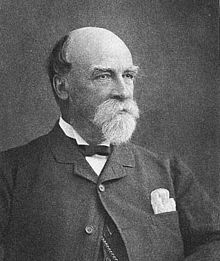John Hay Drummond Hay
Sir John Hay Drummond Hay | |
|---|---|
 | |
| Envoy Extraordinary to Morocco | |
| In office 1845–1886 | |
| Succeeded by | Sir William Kirby Green |
| Personal details | |
| Born | John Hay Drummond Hay 1 June 1816 Valenciennes, France |
| Died | 27 November 1893 (aged 77) Wedderburn Castle, Scotland |
Sir John Hay Drummond Hay GCMG KCB PC (1 June 1816 – 27 November 1893) was the United Kingdom's Envoy Extraordinary at the Court of Morocco in the 19th century.[1][2]
Early life
[edit]John Drummond Hay was born in 1816 in Valenciennes, France,[1] where his father Captain Edward Drummond Hay, a nephew of the ninth Earl of Kinnoul, was serving in the British army of occupation.[3]
Like his elder brother, Edward Hay Drummond Hay, he was educated at the Edinburgh Academy,[4] and then at Charterhouse School.[1]
At the age of 24, he was appointed a paid attaché to the Embassy of Constantinople, where he remained for four years. He was then sent to Morocco to assist his father, who was serving there as Agent and Consul-General. Within a few months, he was promoted; though still having merely the rank of a paid attaché, he succeeded his temporary chief as Agent and Consul-General.[5]
Diplomat
[edit]Drummond Hay's diplomatic service in Morocco would continue for more than forty years, and would involve considerable personal initiative; he was able to exercise significant freedom of action and independence from bureaucratic and political control. Over his lengthy time in Morocco, he developed significant influence both with the Moroccan government and with the Moroccan public at large, aided by his facility for languages.

In 1845, he acted as a mediator between Morocco and Denmark, Sweden, and Spain. In that capacity, he signed the convention which the Sultan concluded with the Court of Madrid. In 1856 he negotiated and signed the Anglo-Moroccan Accords, a general treaty and a commercial convention with the Moroccan government. In 1861 he was promoted to the rank of Minister Resident. His further promotion to the rank of Minister Plenipotentiary took place in 1872, and to that of Envoy Extraordinary in 1880.[7]
He was appointed a Knight Grand Cross of the Order of Saint Michael and Saint George (GCMG) in 1884.[8]
In July 1886, he retired on a pension, and was sworn a Privy Councillor,[9]. However, even in retirement, he continued to reside privately a great part of the year in Morocco, and continued to exercise significant influence there. He died at Wedderburn Castle, near Duns, in Scotland.[2]
Writings
[edit]- Hay, Sir John H. Drummond. 1844. Western Barbary: Its Wild Tribes and Savage Animals. London: John Murray.
- Hay, Sir John H. Drummond. 1888. "Reminiscences of Boar-hunting in Morocco." Murray’s Magazine: A Home and colonial periodical for the general reader, 330-342.
- Brooks, LAE. 1896. A Memoir of Sir John Hay Drummond Hay: Sometime Minister at the Court of Morocco based on His Journals and Correspondence. London: John Murray
References
[edit]- ^ a b c Parish, William Douglas (1879). List of Carthusians, 1800–1879. Lewes: Farncombe and Co. p. 114. OCLC 37118353. Retrieved 8 May 2010.
- ^ a b "Obituary: Sir John Drummond Hay". The Times of London. London. 29 November 1893. p. 7. Retrieved 8 May 2010.
- ^ Khalid Ben-Srhir (2004). Britain and Morocco During the Embassy of John Drummond Hay. Routledge. ISBN 9780203494974. Retrieved 4 January 2014.
- ^ The Edinburgh Academical Club (1914). The Edinburgh Academy Register 1824-1914. Retrieved 2 August 2021.
- ^ "No. 20456". The London Gazette. 25 March 1845. p. 953.
- ^ https://www.judaisme-marocain.org/objets_popup.php?id=469 [bare URL]
- ^ "No. 24819". The London Gazette. 2 March 1880. p. 1790.
- ^ "No. 25420". The London Gazette. 5 December 1884. p. 5669.
- ^ "No. 25614". The London Gazette. 6 August 1886. p. 3779.
Further reading
[edit]- Ben-Srhir, Khalid. (2005). Britain and Morocco During the Embassy of John Drummond Hay, 1845–1886. Taylor & Francis.
- Rigg, J. M. (2004). "Hay, Sir John Hay Drummond- (1816–1893)". Lynn Milne, ed. Oxford Dictionary of National Biography.
|}
